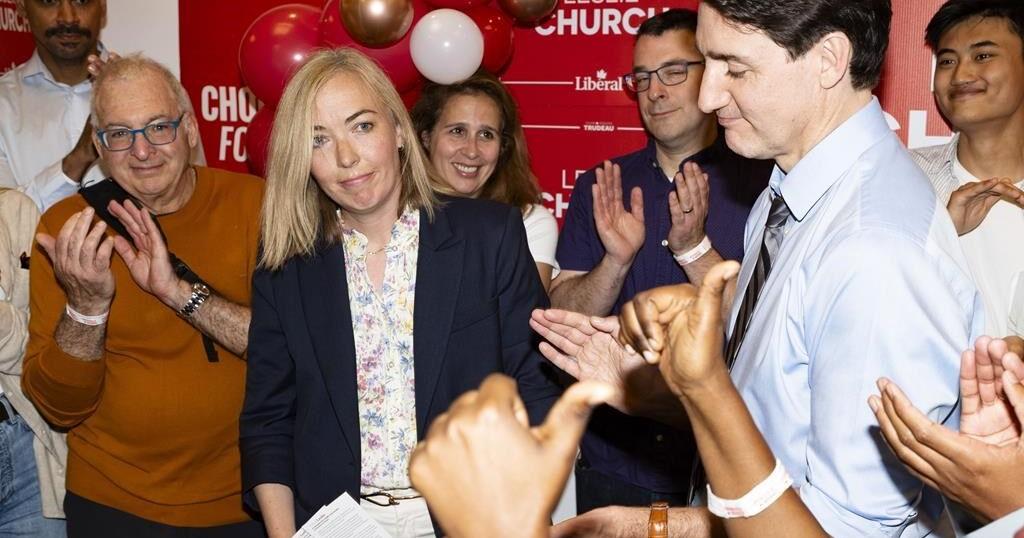TORONTO – It is an urban Toronto seat that has been a virtual cakewalk for the federal Liberals for 30 years and a riding they should not have had to work that hard to win again in a byelection Monday.
But the Liberals’ poor showing in Toronto — St. Paul’s — they were ahead almost the entire night but by slim margins — will not be the only talked about political story around parliamentary water coolers Tuesday.
The other big talker is the ballot protest by a group trying to draw attention to the weaknesses of a first-past-the-post voting system, which stymied poll workers who had to open thousands of ballots containing 84 names that were each nearly a metre long and individually folded up like an old-school map.
With the logistics of counting every ballot by hand, the results trickled in slower than a sloth on his way to Sunday dinner.
Former Liberal chief of staff Leslie Church appeared to be nearing victory in the wee hours of the morning Tuesday, ahead of her Conservative challenger Don Stewart.
“We are feeling great about the result,” Church said at her campaign party in a neighbourhood bar around 12:30 a.m. to the delight of her supporters who chanted her name and shouted, “Call the race.”
But she did not.
“We’re not quite there yet,” she said.
While her Liberal colleagues lauded her as a great candidate with deep political experience as a chief of staff to multiple cabinet ministers, the campaign brought challenges, not the least of which was a cranky electorate that had lost patience with Prime Minister Justin Trudeau.
Toronto-St. Paul’s, in the city’s midtown area, includes some of Toronto’s wealthiest addresses as well as an above-average number of renters, and one of the largest concentrations of Jewish voters in the country.
Rising rents and the Israel-Hamas war played particularly big roles in the campaign and despite nine months of campaigning, Church seemed on track for the worst Liberal showing in the riding since the 1980s.
Carolyn Bennett, the former Liberal cabinet minister whose resignation in January triggered this byelection, won the seat nine times for the Liberals, and all but once by more than 20 percentage points.
Leslie was ahead of Stewart by less than four points around 1:30 a.m. At that point, about one-third of the 192 polls still had to report results, including more than 10,000 votes cast in advance polls which are typically counted last.
Before the polls closed five hours earlier, Elections Canada warned things were going to move slowly. They were not kidding.
The protest group Longest Ballot Committee stacked the ballot with more than 75 independents, almost half of whom ran a year ago in a Winnipeg riding to make the same protest.
While the final votes were cast at 8:30 p.m., not a single result was reported for more than an hour.
Elections Canada spokesman Matthew McKenna said things were just progressing very slowly and was not aware of any issues with the ballots other than their unusual length.
The glacial pace of counting outlasted the Stanley Cup final hockey game by hours.
Stewart’s campaign party at a Jewish restaurant in the riding largely wrapped up after he made an appearance around 11:30 p.m., not conceding though not looking particularly buoyant about the results either.
“Let’s not give it up,” he said, with middling levels of enthusiasm, before reciting Leader Pierre Poilievre’s alphabet soup slogan.
“Axe the tax, build the homes, fix the budget, stop the crime,” he said, drawing big cheers.
The count even outlasted the CBC, whose live stream with host David Cochrane ran a heroic four hours long without commercial breaks. But finally, they too threw in the towel when it appeared it would be hours more before a winner could be declared.
Church showed up at her campaign party to thank her volunteers and supporters at the four-hour point, which unlike Stewart’s remained full of lively supporters.
“We love you Leslie,” one shouted, as she took the small stage to thank everyone for their patience. Then sent her people home too.
The riding is considered to be a must-win for Trudeau, whose government has flailed in the polls for more than a year and now trails Poilievre and the Conservatives by more than 20 points.
Conservatives downplayed their chances leading into the vote — longtime strategist and informal adviser to Poilievre Jenni Byrne told the CBC they had no chance to win before a single result was reported.
But they will see the result as a win even without Stewart being sworn in as an MP. The Conservatives haven’t won a single riding in Toronto proper riding since 2011, with the Liberals sweeping the city in 2015, 2019 and 2021.
To come this close in a riding the Liberals haven’t lost since 1988, is a big boost of steam.
This report by The Canadian Press was first published June 24, 2024.
-By Mia Rabson in Ottawa and Sheila Reid in Toronto.
